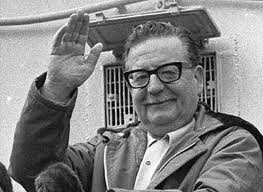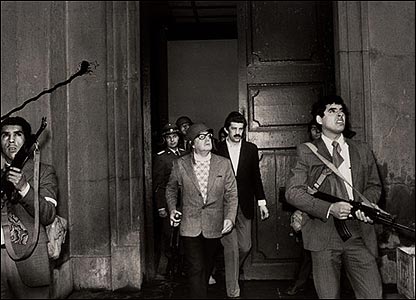OpEds: Digging up Chile’s buried secrets
Op-Ed
Chile’s buried secrets
By exhuming the body of Salvador Allende, an official inquiry aims to lay the past to rest.
- On September 11, 1973, president Salvador Allende appears shortly before his death in the presidential palace La Moneda during General Pinochet’s military coup. Salvador Allende, President of Chile, reportedly committed suicide during the Chilean coup of 1973. Since that time, there has been great controversy between supporters and detractors of Allende on the circumstances of his death. Lagos’s identity as the photographer was not revealed until February 2007, a month after his death. Note the president wears a combat helmet. (Photo: Orlando Lagos)
By Peter Kornbluh and Marc Cooper
The exhumation is part of an attempt to determine once and for all whether the democratically elected Socialist president was killed by the Chilean air force jets and troops that bombed and assaulted his presidential palace or if, as most witnesses concur, Allende took his own life.
The formal judicial inquiry surrounding the exhumation carries significance far beyond simply solving the mystery of Allende’s death on Sept. 11, 1973. The wide-ranging investigation has the potential to redefine the infamous coup led by Gen. Augusto Pinochet. Rather than being remembered as an act of political violence, it may now be acknowledged as a criminal enterprise.
Allende’s disinterment comes as part of a sweeping criminal probe of about 725 deaths that took place under the military regime that ruled in the wake of the coup. These deaths, like Allende’s, have never been fully investigated by the Chilean courts.
After Pinochet’s bloody putsch, army doctors hastily and secretly examined Allende’s body in a military facility, and he was buried in an unmarked grave 100 miles from the capital. “Some uncertainty hangs over the way in which the president died,” the British attache reported in a confidential cable three weeks after the coup.
For decades, many believed that the military had executed him, a suspicion reinforced by the eventual discovery of tapes of military communications the day of the coup in which Pinochet is heard threatening to have Allende killed even if he surrendered. “Kill the bitch and you kill the litter,” Pinochet declared.
But Allende’s own doctors and security guards, who were with him in La Moneda presidential palace, have said the president killed himself as Pinochet’s troops closed in on his office. His family and many of his political supporters also believe he committed suicide.
One of the legal — and moral — theories fueling this new investigation is the idea that even if Allende did die by his own hand, he was nevertheless a victim of the savage political violence that engulfed him and the Chilean nation that day. “It is not just the circumstances of his death that are being investigated,” observes his daughter, Chilean Sen. Isabel Allende. “It is the context in which he died.”
 Indeed, the decision by the special magistrate, Mario Carroza, to open an official inquiry into Allende’s death has resulted in the first formal interrogations of key military personnel who participated in the violence of Chile’s 9/11 — among them officials who are believed to have been in contact with agents of the United States, which covertly supported the coup.
Indeed, the decision by the special magistrate, Mario Carroza, to open an official inquiry into Allende’s death has resulted in the first formal interrogations of key military personnel who participated in the violence of Chile’s 9/11 — among them officials who are believed to have been in contact with agents of the United States, which covertly supported the coup.
This judicial inquiry has the potential to, in essence, put the coup itself on trial. The brutality of Allende’s overthrow on that September morning, with air force jets dive-bombing his palace in downtown Santiago and troops rounding up thousands of his political supporters and summarily executing [hundreds and later thousands, the number has never been established] of them, set the tone for the assassinations, disappearances and torture carried out by the U.S.-backed military regime that seized power that day.
Pinochet had been out of power for eight years when he was arrested in London in October 1998 on a Spanish warrant for human rights crimes. His yearlong detention punctured his shield of immunity and energized a vigorous new international commitment toward accountability for crimes against humanity.
Indeed, what became known as the “Pinochet precedent” contributed directly to the willingness of the international community to recognize dictators such as Libya’s Moammar Kadafi as not just perpetrators of political repression but as potential war criminals.
But while Pinochet did not escape prosecution — at home or abroad — for committing similar crimes against humanity, the putsch he led was never designated as illegal and the death and destruction that accompanied it has largely gone unpunished. The military coup has often been described as a political necessity, and it has never been formally recognized as a crime against Chile’s Constitution, its people and their human rights. Even as Pinochet was being indicted, there were still a startling number of voices among political analysts and the mass media that offered positive assessments of his ruthless dictatorial regime.
Allende’s death symbolized the murder of one of the hemisphere’s most developed and civilized democracies. “My sacrifice will not be in vain,” he declared in his last radio transmission to the nation as the military attacked the presidential palace. “…It will be a moral lesson that will punish felony, cowardice and treason.” The methodical judicial examination of the events of Sept. 11, 1973, which cost Allende his life, will advance his final prophecy and could lead to the felony punishment of those who perpetrate political violence in the future.
Peter Kornbluh is a senior analyst at the National Security Archive and the author of “The Pinochet File.” Marc Cooper is a journalism professor at the USC Annenberg School for Communication & Journalism; in 1973 he was a translator for President Salvador Allende, and lived through the military coup.
Copyright © 2011, Los Angeles Times
[donation-can goal_id=’support-tgp-before-were-gone’ show_progress=true show_description=true show_donations=false show_title=true title=”]

